Essay Papers Writing Online
How to write an engaging and informative interview essay that captivates readers.

Are you ready to embark on a journey of words and emotions? Do you yearn to bring real-life stories to life on paper? If so, then the art of conducting an interview essay might just be the path for you. Through a delicate amalgamation of acute observation, introspection, and empathetic listening, you can unravel the intricacies of a person’s life and translate their experiences into a captivating piece of writing. Discover the key steps and techniques that will help you become a master of the interview essay genre.
Imagine yourself as a literary detective, armed with a notepad and pen, delving into the depths of someone’s thoughts and experiences. Your duty is to uncover the hidden layers of a person’s soul and translate them into a narrative that captivates the reader from the very first word. The interview essay offers a unique opportunity to break through the boundaries of traditional storytelling and delve into the realm of intimate conversations. Using skillful questioning and active listening, you can extract stories that will resonate with readers and give them a deeper understanding of the human condition.
Crafting a successful interview essay requires the delicate balance of objective reporting and subjective interpretation. It is a dance between the facts and the emotions, the words spoken and the unspoken truths. As an interviewer, your role extends beyond mere transcription; you are an interpreter, a curator of stories, and a storyteller. By carefully selecting the most powerful quotes, weaving them into a coherent narrative, and providing insightful context, you can create a compelling tapestry of human experiences that will inspire and enlighten your readers.

Overview of Interview Essays
In this section, we will explore the fundamental aspects of conducting and presenting an interview essay. By delving into the art of conversation and storytelling, interview essays provide a unique opportunity to capture the essence of an individual’s experiences and perspectives. These essays allow readers to gain insight into a person’s life journey, accomplishments, and insights on various topics, offering a glimpse into their world.
Interview essays go beyond the realm of traditional journalistic interviews, offering a more personal and in-depth exploration of the interviewee’s thoughts and emotions. Unlike a standard news article or report, interview essays focus on the individual and their unique perspective, providing a platform for their voice to be heard.
Throughout the essay, the interviewer must skillfully navigate the conversation, asking thoughtful and probing questions to elicit meaningful responses. It is crucially important to establish a comfortable and trusting environment, allowing the interviewee to open up and express themselves authentically. The interview process requires active listening and keen observation, ensuring that the essence of the interviewee is accurately portrayed.
The structure of the interview essay typically begins with an engaging introduction that introduces the interviewee and sets the tone for the rest of the piece. Following the introduction, a series of questions and answers, presented in a logical and coherent manner, form the body of the essay. This section should highlight the most compelling and enlightening aspects of the interview, showcasing the interviewee’s unique insights and experiences.
As the interview draws to a close, a well-crafted conclusion synthesizes the main points discussed during the interview, providing a final reflection on the interviewee’s thoughts and perspectives. This section should leave the reader with a lasting impression of the interviewee and their story.
In summary, interview essays offer a captivating and rich exploration of an individual’s life and experiences. Through thoughtful questioning and careful listening, these essays provide a platform for the interviewee’s voice to be heard, shedding light on their unique perspective and contributions to the world.
Choosing an Interviewee
When embarking on the task of conducting an interview essay, one of the most crucial decisions to make is choosing the right interviewee. This individual will be the subject of your essay and plays a significant role in shaping the overall narrative and content. Therefore, it is important to carefully consider several factors when selecting an interviewee.
First and foremost, it is essential to choose an interviewee who possesses expertise or experience in the subject matter you wish to explore. The interviewee should have valuable insights and a deep understanding of the topic, ensuring that the interview will provide meaningful and informative content. Consider professionals, experts, or individuals who have unique perspectives that align with your essay’s theme.
In addition to expertise, it is crucial to select an interviewee who is willing and enthusiastic about participating in the interview. Look for individuals who are open to sharing their thoughts and experiences, and who express genuine interest in engaging in a conversation about the chosen topic. This will ensure that the interview is engaging and that the interviewee is willing to provide detailed and insightful responses.
Another factor to consider when choosing an interviewee is their accessibility. It is important to select someone who is readily available and willing to commit the necessary time for the interview. Consider individuals who have a flexible schedule or who are willing to accommodate your interview request. This will help ensure that you can conduct the interview within your desired timeframe.
Lastly, consider the diversity and representation that the interviewee can bring to your essay. Aim for inclusivity and diversity by selecting individuals from different backgrounds, cultures, or perspectives. This will enrich your essay and provide a broader range of insights and experiences to draw from.
In conclusion, choosing the right interviewee is a critical step in writing a successful interview essay. It requires careful consideration of factors such as expertise, willingness to participate, accessibility, and diversity. By selecting the most suitable interviewee, you can ensure that your essay will be engaging, informative, and provide a unique perspective on the chosen topic.
Tips for selecting the right individual to interview for your article

Choosing the right person to interview for your essay is a crucial step in ensuring that your piece is insightful and engaging. The individual you select should have firsthand knowledge or experience related to your topic, offering unique insights and perspectives. Taking the time to carefully select the right person will not only enhance the quality of your interview essay but also lend credibility to your work.
Firstly, consider the expertise and background of the person you are considering interviewing. Look for individuals who have extensive knowledge and experience in the field you are focusing on. This could be a subject matter expert, a professional in the industry, or someone who has had personal experiences relevant to your topic. These individuals can provide valuable insights and opinions, allowing your essay to delve deeper into the subject matter.
In addition to expertise, it is essential to choose someone who is articulate and can effectively convey their thoughts and experiences. Good communication skills are a vital aspect of a successful interview. Look for individuals who can express themselves clearly and concisely, ensuring that the information they provide is easy to understand and engaging for your readers.
Another important factor to consider when selecting an interviewee is their availability and willingness to participate. Ensure that the person you choose is willing and able to commit the necessary time and effort to the interview process. This could include conducting in-person interviews, phone interviews, or even email correspondence. Being flexible and accommodating to the individual’s schedule is key to obtaining the information you need for a compelling interview essay.
Finally, aim for diversity when selecting an interviewee. Consider individuals from different backgrounds, perspectives, and experiences. This will not only provide a well-rounded view of your topic but also make your essay more relatable and interesting to a wider audience. Including diverse voices and opinions will enrich your work and make it more impactful.
By following these tips and selecting the right person to interview, you can ensure that your essay is informative, engaging, and offers a unique perspective on your chosen topic.
Preparing for the Interview
Getting ready for an interview is a crucial step towards a successful conversation that will leave a lasting impression on the interviewer. Adequate preparation is important as it helps you feel confident and ready to showcase your skills and qualifications. In this section, we will discuss the key steps to take before an interview to ensure you are well-prepared and can present yourself in the best possible light.
- Research the company: Before attending an interview, it is essential to research the company you are interviewing with. This includes understanding their mission, values, products or services they offer, and any recent news or projects. This knowledge will not only demonstrate your interest in the company but also allow you to ask relevant questions during the interview.
- Analyze the job description: Take the time to thoroughly analyze the job description for the position you are applying for. Identify the key skills, qualifications, and responsibilities mentioned in the description. This will help you tailor your answers during the interview and showcase how your experience aligns with the requirements of the role.
- Prepare your answers: It is a good idea to anticipate some of the questions that may be asked during the interview. Practice your answers to common interview questions, such as “Tell me about yourself” or “What are your strengths and weaknesses?” This preparation will help you showcase your skills and qualifications confidently and concisely.
- Prepare questions to ask: In addition to answering questions, you should also prepare some questions to ask the interviewer. This shows your enthusiasm and interest in the role and allows you to gather more information about the company and the position. Consider asking about company culture, team dynamics, or opportunities for growth.
- Dress appropriately: First impressions matter, so it is important to dress professionally for the interview. Research the company’s dress code and aim to dress slightly more formal than what is expected. Ensure that your attire is clean, ironed, and appropriate for the industry.
- Practice good body language: During the interview, your body language can speak volumes. Practice good posture, maintain eye contact, and use confident and friendly gestures. This will help you appear engaged and interested in the conversation.
- Gather necessary documents: Before the interview, gather all necessary documents, such as copies of your resume, cover letter, and any relevant certifications or references. Organize these documents neatly in a folder or portfolio, so they are easily accessible during the interview.
- Plan your route and arrive early: Before the day of the interview, plan your route and ensure you know how to get to the location. Consider traffic or public transport delays, and aim to arrive at least 10-15 minutes early. This will give you time to relax, collect your thoughts, and make a good first impression.
By following these preparation steps, you will increase your chances of success during the interview. Remember to stay calm, be yourself, and let your qualifications and enthusiasm shine!
Steps to take before conducting the interview to ensure its success
Prior to conducting an interview, there are several key steps one should take to ensure its success. By carefully preparing and organizing beforehand, you can maximize the outcome of the interview and gather the most valuable insights and information from your subject.
- Research your subject: Take the time to thoroughly research your subject before the interview. Familiarize yourself with their background, achievements, and any relevant work they may have done. This will not only help you ask informed and insightful questions but also demonstrate your interest and preparedness during the interview.
- Define your goals: Determine what specific information or insights you hope to gain from the interview. Clarify your objectives and the overall purpose of conducting the interview. This will help you structure your questions and guide the conversation in a focused and meaningful direction.
- Prepare a list of questions: Create a list of questions that will prompt your subject to share their experiences, opinions, and expertise. Mix open-ended questions with more specific ones to encourage thoughtful and detailed responses. Consider the flow and order of your questions to ensure a smooth and logical conversation.
- Consider the logistics: Plan and organize the logistics of the interview in advance. Determine the best format for the interview, whether it is in person, over the phone, or through video conferencing. Confirm the date, time, and location if applicable. Additionally, make sure you have all the necessary equipment ready, such as recording devices or notepads.
- Establish rapport: Building a rapport with your subject is crucial for a successful interview. Prior to the interview, introduce yourself and explain the purpose of the interview. Create a comfortable and welcoming atmosphere during the actual interview to allow your subject to feel at ease and open up more naturally.
- Anticipate challenges: Anticipate potential challenges or obstacles that may arise during the interview. Prepare alternative strategies or questions to handle any unexpected circumstances. By being flexible and adaptable, you can ensure the smooth progression of the interview.
- Respect confidentiality: If your interview involves sensitive or confidential information, assure your subject of confidentiality and obtain their consent to share certain details. This will help establish trust and encourage them to share more freely and openly.
By following these steps before conducting an interview, you can set the stage for a successful and valuable exchange of information. Proper preparation and organization will ensure that you extract the most meaningful insights and present a well-rounded and informative interview.
Conducting the Interview
During this phase, you will have the opportunity to engage in a face-to-face conversation with your interviewee. This is a crucial step in gathering valuable information for your interview essay. The interview allows you to unravel the unique perspectives, experiences, and insights of your subject, bringing depth and authenticity to your writing.
Before the interview, it’s important to research your interviewee and become familiar with their background and work. This preparation will enable you to ask informed questions and show respect for their expertise. Showing genuine interest in their work will make them more willing to open up and share their insights during the interview.
When conducting the interview, create a comfortable and relaxed environment for your interviewee. Establishing a friendly rapport will help them feel at ease and encourage thoughtful responses. Begin by asking a few general questions to ease into the conversation and then gradually move into more specific topics of interest. Active listening is key during the interview; pay attention to not only the words spoken but also the tone, body language, and emotions conveyed.
As you progress through the interview, probe deeper into the interviewee’s thoughts and experiences. Ask open-ended questions that invite detailed and reflective responses. Be prepared to adapt your questions based on their responses to keep the conversation flowing naturally. It’s important to strike a balance between guiding the conversation and allowing your interviewee to express themselves freely.
Remember to be respectful and considerate throughout the interview process. Avoid interrupting and allow your interviewee to fully express their thoughts. Take notes during the interview to capture important details and to ensure accuracy in your essay. Don’t hesitate to ask for clarification or additional information if needed.
By conducting a successful interview, you will gather rich material to create a compelling and engaging interview essay. The insights and personal anecdotes shared by your interviewee will add depth and authenticity to your writing, making it a truly captivating piece.
Techniques and strategies for effectively interviewing your subject
When conducting an interview, it is important to have a set of techniques and strategies to ensure a successful and insightful conversation with your subject. By employing these techniques, you can gather valuable information, establish rapport, and make the most out of your interview.
- Prepare: Before the interview, do thorough research on your subject to familiarize yourself with their background, expertise, and accomplishments. This will enable you to ask informed and relevant questions during the interview.
- Establish rapport: Building a connection with your subject is crucial to create a comfortable and open atmosphere during the interview. Begin by introducing yourself, showing genuine interest, and actively listening to their responses.
- Ask open-ended questions: Instead of asking questions that can be answered with a simple “yes” or “no,” focus on open-ended questions that encourage your subject to provide detailed and insightful responses. These questions often start with “how,” “why,” or “tell me about.”
- Active listening: During the interview, give your full attention to your subject and demonstrate active listening. This involves maintaining eye contact, nodding, and providing verbal cues to show that you are fully engaged in the conversation. Avoid interrupting and allow your subject to complete their thoughts.
- Probing and follow-up questions: To dig deeper into a topic or clarify any ambiguous answers, ask probing questions. These questions can help you extract more specific details and provide a more comprehensive understanding of your subject’s perspective.
- Keep it conversational: While it’s important to maintain a professional approach, aim to make the interview feel like a conversation rather than an interrogation. Use a friendly tone, ask follow-up questions, and be empathetic to create an environment where your subject feels comfortable sharing their thoughts and experiences.
- Record or take notes: To fully capture the interview, consider recording the conversation with your subject’s permission. Alternatively, take detailed notes during the interview to ensure accuracy when transcribing and referring back to the interview later.
- Thank your subject: Once the interview is complete, remember to express gratitude to your subject for their time and insights. Sending a follow-up message or a handwritten note as a token of appreciation can leave a positive impression and may result in future interview opportunities.
By utilizing these techniques and strategies during your interview, you can obtain valuable information, establish meaningful connections, and create a successful and insightful interview essay.
Related Post
How to master the art of writing expository essays and captivate your audience, convenient and reliable source to purchase college essays online, step-by-step guide to crafting a powerful literary analysis essay, unlock success with a comprehensive business research paper example guide, unlock your writing potential with writers college – transform your passion into profession, “unlocking the secrets of academic success – navigating the world of research papers in college”, master the art of sociological expression – elevate your writing skills in sociology.

Interview Essay
Interview essay generator.
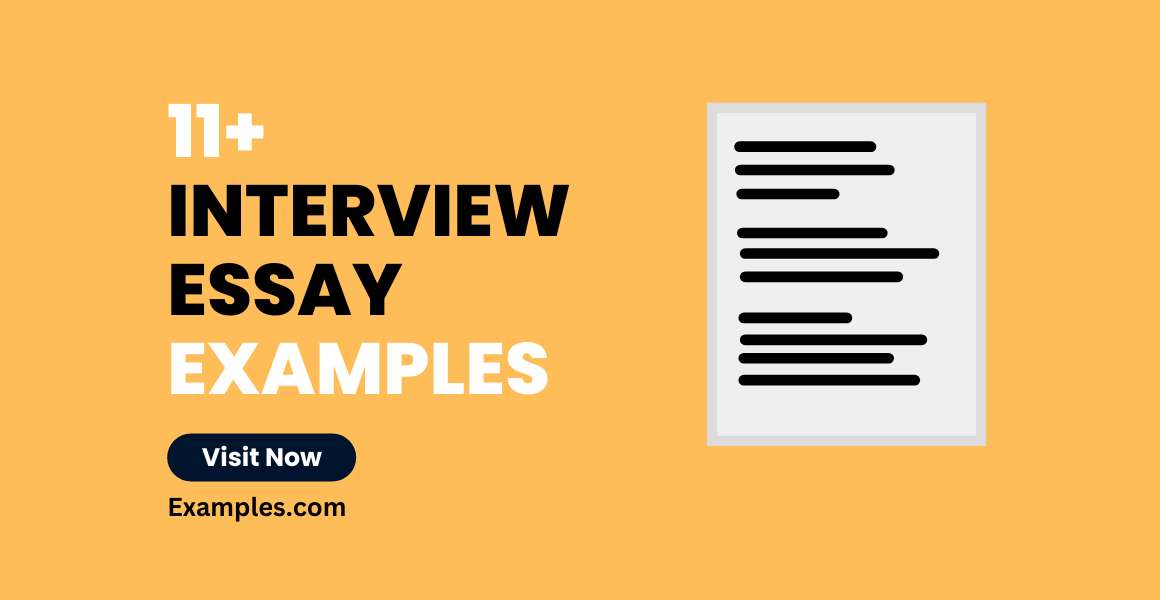
Essay writing is different for everyone. Some people choose to go to the library and search for facts on a given subject, while others like to focus on gathering information through personal statements .
During this interview process, interviewers typically ask a series of interview questionnaire that their readers may want to know about. These details are either recorded or jotted down by the interviewee. With what has been gathered, an individual may then write a complete essay regarding the exchange.
Interview Essay Sample
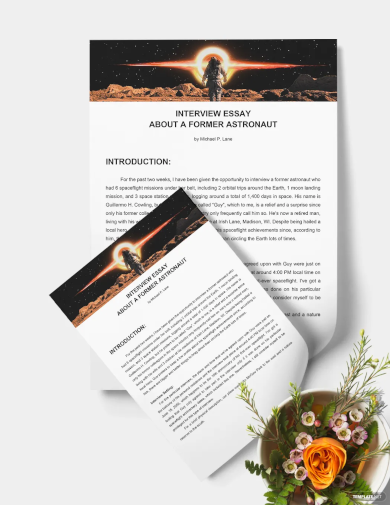
- Google Docs
Size: 168 KB
Personal Interview Essay Template
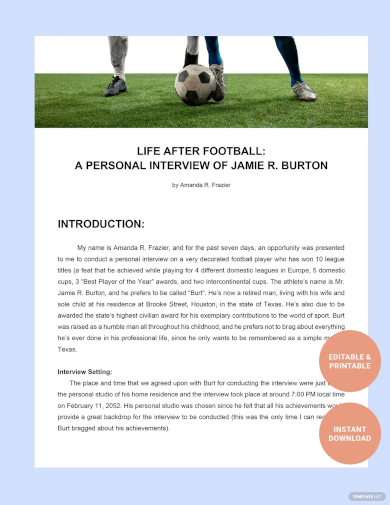
Size: 136 KB
Nursing Interview Essay Template
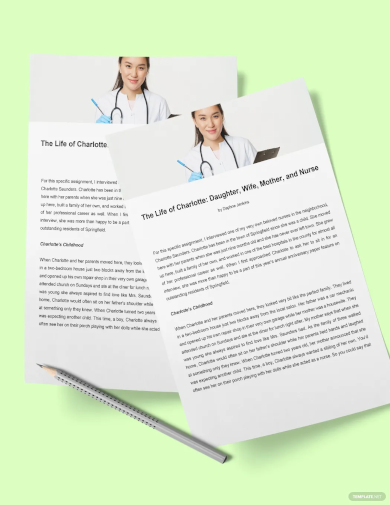
Size: 123 KB
Leadership Interview Essay Template
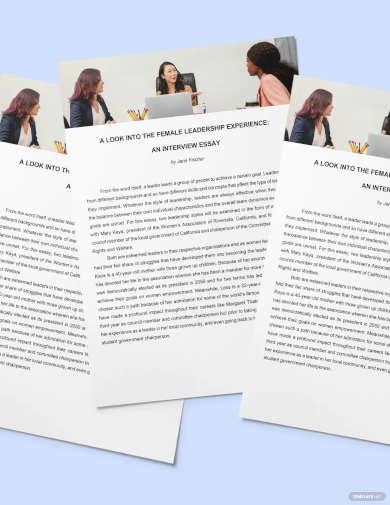
Size: 154 KB
Teacher Interview Essay Template
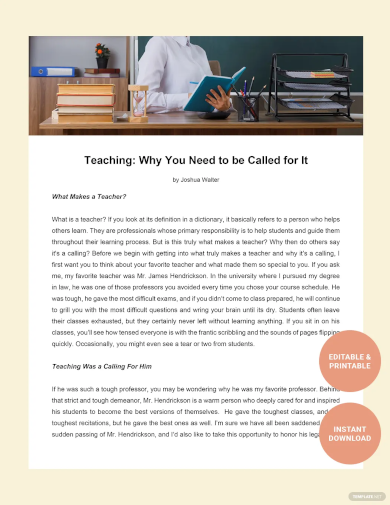
Size: 150 KB
Job Interview Essay Sample
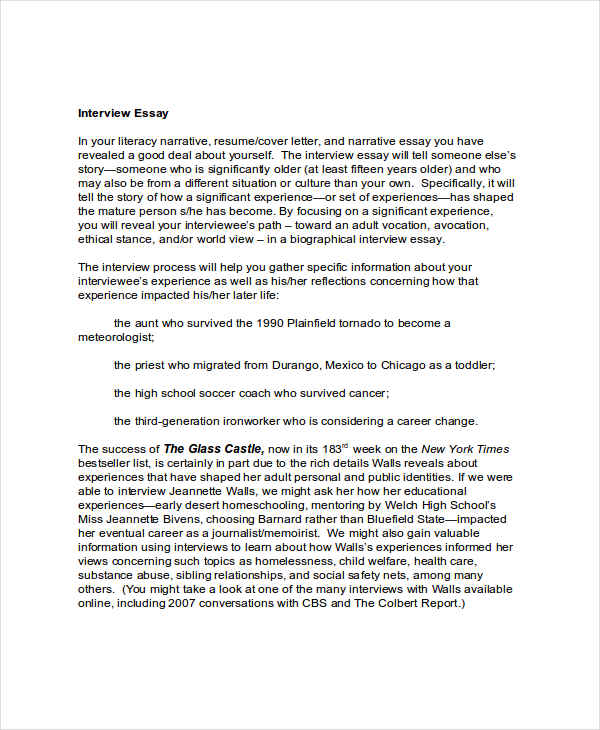
Narrative Interview
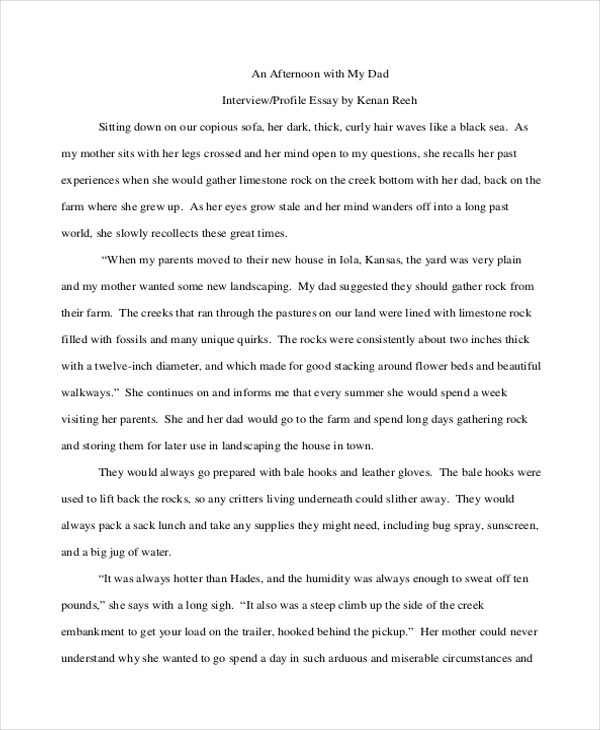
Size: 70 KB
Career Interview Essay
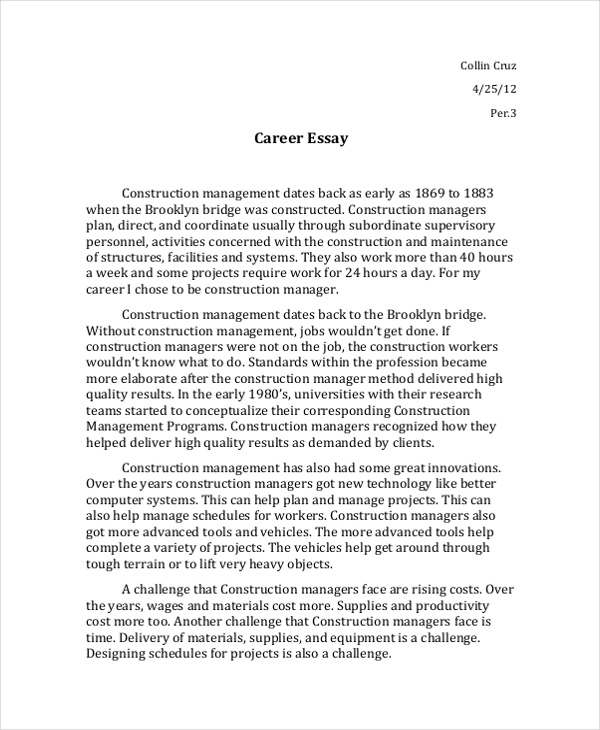
Size: 29 KB
What Is an Interview Essay?
Interview essays are typically based on research gathered from personal testimonies. This could be based on one’s personal experiences or their own input on a given matter. It may be informative essay , descriptive essay , or even persuasive essays , depending on the questions asked by the interviewer.
The content of the essay may include direct quotes from the interview or it may come in a written narrative form. Through this, we are able to gain additional information from a particular perspective.
What to Include in an Interview Essay
For every essay, a thesis statement is needed to help your readers understand the subject being tackled in your work. For an interview short essay , you would need to talk about your interviewee. Any information that will create a credible image for your interviewee will be necessary.
Next, it’s necessary to include the significant ideas that you have acquired from your interview. Ideally, you should pick three of these ideas, elaborate what has been said, and present it in paragraphs. Be sure to emphasize these points in a detailed and concise manner, a lengthy explanation might be too redundant. You may also see sample essay outlines .
Leadership Essay
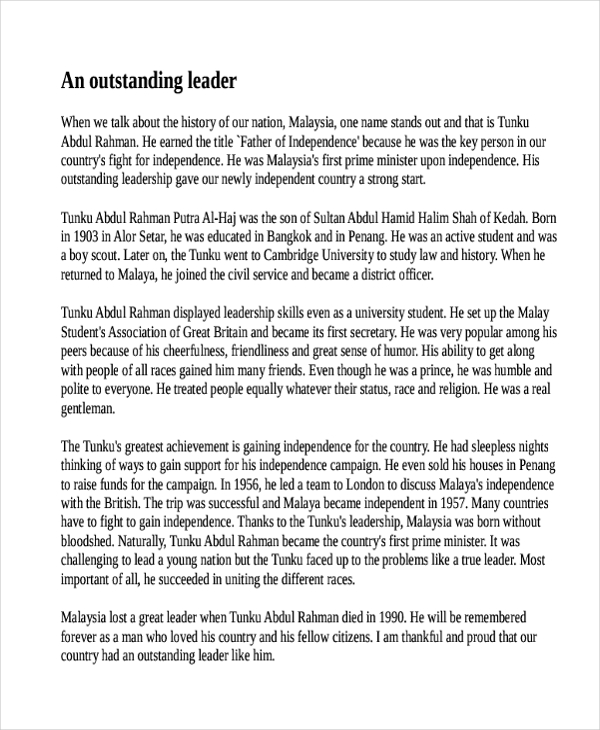
Size: 24 KB
Nursing Interview Example
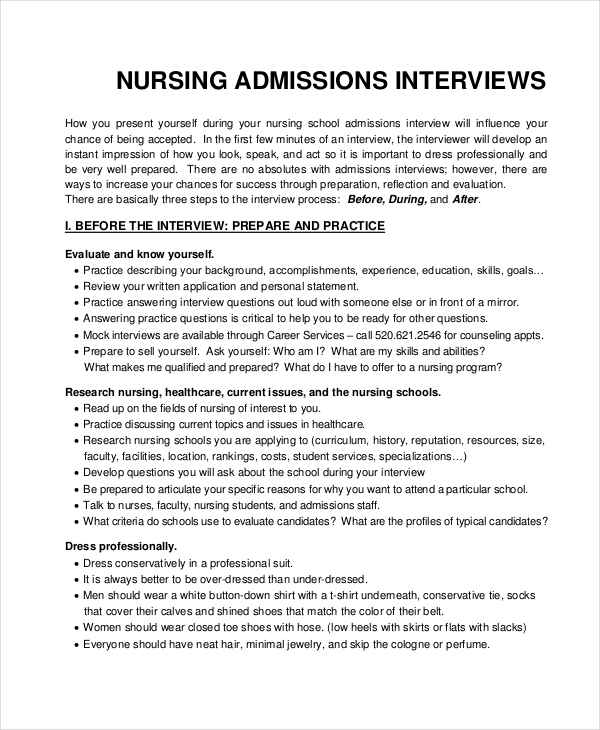
Size: 146 KB
Personal Interview
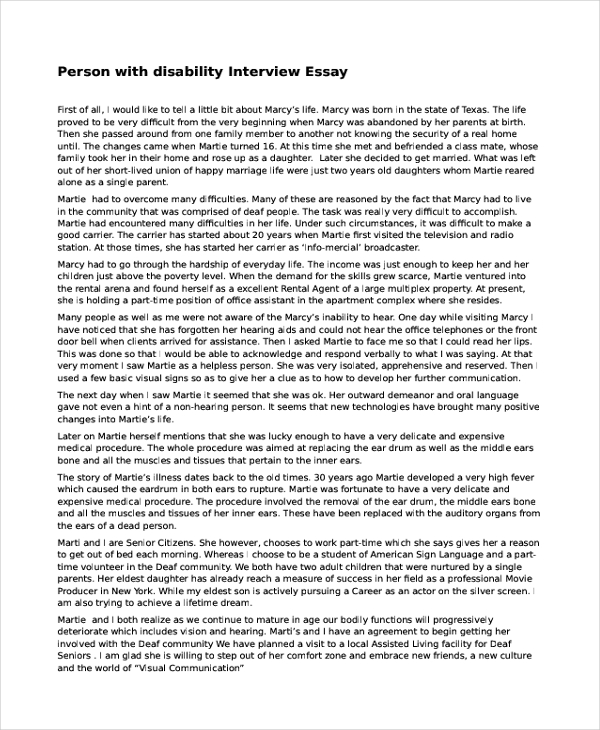
Size: 18 KB
Parent Interview Sample
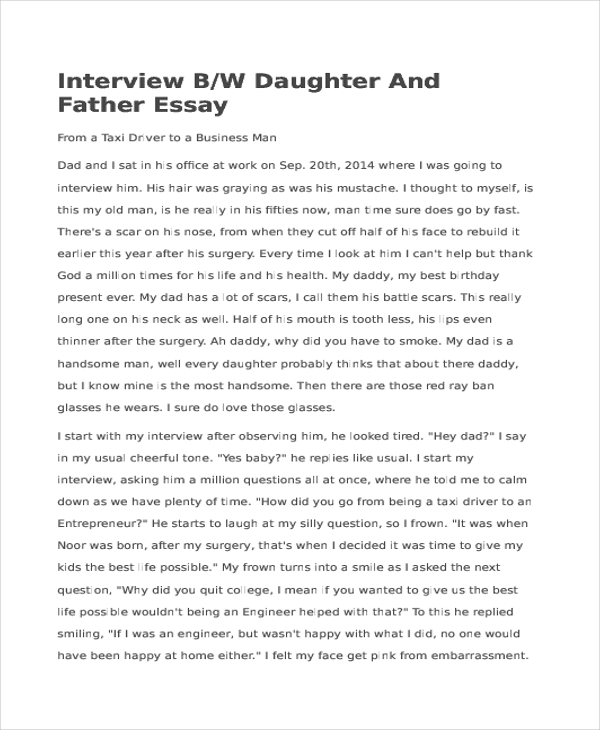
Size: 15 KB
Guidelines for an Interview Essay
When writing an interview essay, it would be best to create an outline first.
Organize the information you have gathered from your interviewee and structure it in a logical order. This could be from one’s personal information to the most compelling details gathered. Be reminded of the standard parts of an essay and be sure to apply it to your own work.
Even when most, if not all, of your essay’s content is based on what you have gathered from your interviewee, you would still need to create a good starting of essay and end to your essay.
Additionally, do not forget to put quotation marks around the exact words used by your interviewee. It would also be best to proofread your work and make sure that there is a smooth transition for each thought. You may also like personal essay examples & samples.
How to Conclude an Interview Essay?
You can end your interview essay how ever you wish to do so. It could be about your learning from the interview, a call to action, or a brief summary writing from what has been expressed in the essay.
But keep in mind, this would depend on your purpose for writing the essay. For instance, if you interviewed a biologist to spread awareness about mother nature, then it would be best to conclude your essay with a call to action. Knowing this, it’s important to end your essay well enough for it to be memorable.
Text prompt
- Instructive
- Professional
Write an Interview Essay on a local community leader.
Discuss the career journey of a teacher in your Interview Essay.
- PRO Courses Guides New Tech Help Pro Expert Videos About wikiHow Pro Upgrade Sign In
- EDIT Edit this Article
- EXPLORE Tech Help Pro About Us Random Article Quizzes Request a New Article Community Dashboard This Or That Game Forums Popular Categories Arts and Entertainment Artwork Books Movies Computers and Electronics Computers Phone Skills Technology Hacks Health Men's Health Mental Health Women's Health Relationships Dating Love Relationship Issues Hobbies and Crafts Crafts Drawing Games Education & Communication Communication Skills Personal Development Studying Personal Care and Style Fashion Hair Care Personal Hygiene Youth Personal Care School Stuff Dating All Categories Arts and Entertainment Finance and Business Home and Garden Relationship Quizzes Cars & Other Vehicles Food and Entertaining Personal Care and Style Sports and Fitness Computers and Electronics Health Pets and Animals Travel Education & Communication Hobbies and Crafts Philosophy and Religion Work World Family Life Holidays and Traditions Relationships Youth
- Browse Articles
- Learn Something New
- Quizzes Hot
- Happiness Hub
- This Or That Game
- Train Your Brain
- Explore More
- Support wikiHow
- About wikiHow
- Log in / Sign up
- Education and Communications
- College University and Postgraduate
- Academic Writing
How to Write an Interview Essay
Last Updated: March 11, 2024 Fact Checked
This article was co-authored by Diane Stubbs . Diane Stubbs is a Secondary English Teacher with over 22 years of experience teaching all high school grade levels and AP courses. She specializes in secondary education, classroom management, and educational technology. Diane earned a Bachelor of Arts in English from the University of Delaware and a Master of Education from Wesley College. This article has been fact-checked, ensuring the accuracy of any cited facts and confirming the authority of its sources. This article has been viewed 468,428 times.
An interview essay is designed to give the reader a general impression of the interview subject and to present their thoughts on a select group of topics. It also offers the opportunity to develop deeper insights by analyzing the interviewee's responses within a larger context. Interview essays are a common school assignment, and provide useful skills for those interested in journalism, or just being good writers in general. There are several formats that fit into the category, but a good interview essay of whatever type can make the reader feel as though they were asking the questions.
Interviewing for an Essay

- If your essay is to be a factual piece, you'll want to interview someone who has expertise in the subject matter you'll be addressing. If your paper is about a science topic, you'll want to interview a scientist in that field. If your paper is about a period of history, you'll want to interview either a historian or someone who's lived through that period of history.
- If you plan to make your essay an opinion piece, you'll likely want to interview someone who has a strong opinion about the topic covered in your essay. Ideally, you want someone who can express opinions articulately, and who also has credentials in the area you plan to write about.
- If your piece will have a narrow perspective, you'll need to interview only one or two people. If your piece will present a general consensus, you'll need to interview more people, probably with varying expertise and credentials.

- When available, read works about and works written by your subject, both in print and online. At the same time, research the topic associated with your subject. The more you know about both, the more intelligent questions you can ask.
- Look for previous interviews your subject has given, as well. These will give you an idea of what questions the person has been asked before, so you can decide on appropriate subjects for your own questions, including questions that no one else has asked.
- Questions that require "yes" or "no" answers are good for gathering specific factual information; open-ended "how," "why," and "tell me about" questions are great for gathering additional background material not found in your research.
- Draw up a list of the questions you are prepared to ask. Have more questions ready than you will likely use, so that you can make adjustments as the interview takes place. (For instance, your subject may begin focusing on what you thought was a side topic, but turns out to be the key part of your interview.) Rank your questions in order of importance to make sure you ask your best ones, or list them all in the order you'd ask them and color-code the most important ones.

- Choose a quiet place with few distractions for your interview site. A library, restaurant, or campus location if you're doing this for a college writing class would be suitable.
- You may want to get the interviewee's consent to use their comments in your essay in writing, as well as permission to record those comments during the interview. By law, if you are recording an interview conducted over the phone, you must obtain written permission. [4] X Trustworthy Source University of North Carolina Writing Center UNC's on-campus and online instructional service that provides assistance to students, faculty, and others during the writing process Go to source
- It's helpful to have a backup interviewee in case the person you plan to interview can't make it.
- Be on time at the place you've agreed to meet for the interview.

- Using a recording device (with permission) is almost always advisable, as it permits you to save your note-taking for jotting down your insights on contexts, themes, how your subject approaches the questions, his/her comfort level, and so on.
- Be patient and respectful as you ask your questions and wait for responses. Give the interviewee time to reflect, and you will likely be rewarded with more insightful answers. A few deeper responses are usually better than many superficial ones.
- Immediately after the interview, write down your thoughts and impressions about the interview and interviewee. They may help you shape the essay.
- Always end the interview by thanking the person.
Writing the Essay

- Narrative format. This form allows paraphrasing of some information the interviewee says, along with direct quotes for the material you most want to emphasize. This is the most likely format for a class assignment, and offers the most opportunity to add context and analysis.
- Conversational format. This is a looser format than the formal writing style required for most essays. You can address the reader directly and use both first and second person. This format can be suitable for anything from class assignments to magazine articles.
- Question-and-answer format. This form presents your questions to the interviewee, followed by the interviewee's responses. (That is, the text looks something like this: (Your Name): How long have you been in the circus? (Interviewee's Name): About 35 years.) These are always direct quotes, although you may insert explanatory material in parentheses and substitutions, such as a person's name in place of a personal pronoun, in brackets. This format is best suited for essays with only a single interviewee or a closely related group, such as spouses or the core cast of a TV show.
- Informative format. This format usually interweaves the interview with research you've done on the subject, incorporating some of that research in the text to provide background and give it a little more color.

- Read over your interview notes and listen to any audio / video recordings you have. Utilizing both whenever available will allow you to thoroughly consider both the highlights of the interview and the most significant themes to emerge from it. These, in turn, will inform your outline of what information your essay will cover and how it will appear. [9] X Research source
- One possible outline could be an introduction that starts with an anecdote about the interviewee and then presents your thesis statement, several key points that support the main focus, and a conclusion that summarizes the information presented. Traditional school essays often utilize a five paragraph format (introduction, three supporting paragraphs, conclusion), and this can often work with interview essays as well.

- If, however, the purpose of your essay is to use your interviewee's comments to support a position or examine a larger theme, your thesis will probably be a statement of that position or theme, with the interview / interviewee placed within that context. For instance: "John Doe's mixed feelings of pride and betrayal reflect those shared by many Vietnam veterans still with us."
- Regardless of essay format, make your thesis clear and concise, and be sure that the remainder of your essay refers back to it. See How to Write a Thesis Statement for more advice.

- Interviews can sometimes produce a good deal of repetitive answers (even with high-quality questions), so you may need to trim repetitions and unnecessary elements from the body of your essay. Make sure that whatever material you do keep remains true to both the spirit of the interview and the overarching focus of your essay. [10] X Research source
- A handout from the Writing Center at the University of North Carolina (available at http://writingcenter.unc.edu/handouts/oral-history/ ) provides a wealth of valuable materials on interview essays. It includes, for instance, examples of how to utilize the same interview materials in a transcription (question-and-answer format), a presentation of individual experiences (quotations and paraphrases), and the placing of the interview / interviewee in a larger context (paraphrasing and quotations with ample explanation).

- Reading over the essay yourself is a good start, but it is always wise to have another set of eyes look it over as well. Another reader is likely to catch errors, repetitions, and unclear sections that you have glossed over. [12] X Research source
- Go back to your original interview notes, recordings, and transcripts, and make sure that your essay continues to reflect the actual interview. Layers of editing and revising can sometimes cause the essay to drift away from the original source and intent. You may even want to let the interviewee read it over to ensure that it captures their voice. [13] X Research source

- Any materials you used for research, information about the interviewee, or context for the essay itself should be referenced in the approved citation format for your essay.
- Make sure one more time that any direct quotations from your source are placed in quotation marks, and any paraphrasing is done without quotation marks. Don't put words in your subject's mouth, and respect the words that do emerge from it.
What Are The Dos And Don’ts Of a Journalistic Interview?
Expert Q&A

- After the interview, send the interviewee a written thank-you note expressing your appreciation for their time. Thanks Helpful 0 Not Helpful 0
- If the person you're interviewing is busy or elderly, you may want to plan for more than one interview session. Observe the interviewee for signs of impatience or fatigue. Conduct multiple, shorter sessions if necessary. Thanks Helpful 0 Not Helpful 0

- If you plan to interview someone over the telephone, permission to record the conversation is required by law. Thanks Helpful 15 Not Helpful 3
You Might Also Like

- ↑ http://writingcenter.unc.edu/handouts/oral-history/
- ↑ https://www.indeed.com/career-advice/interviewing/interview-paper
- ↑ http://www.whatkidscando.org/featurestories/2007/maine_students/tip_sheets/FIRST-PERSON%20ESSAYS%20TIP%20SHEET.pdf
- ↑ http://www.brighthubeducation.com/help-with-writing/97515-how-to-write-an-interview-essay/
- ↑ https://owl.purdue.edu/owl/general_writing/the_writing_process/proofreading/proofreading_suggestions.html
About This Article

To write an essay from an interview, you’ll first have to decide on the format the essay will take, as this will determine the structure and what you write. The most common form is the narrative format, in which you use direct quotes and paraphrase your subject to add context and detail, or you can write in a more conversational tone, or even in a directly transcribed question-and-answer form. Once you decide on format, plan an outline by forming a central thesis, which will be the central statement your essay is making. Add onto the outline by drafting supporting evidence directly from the interview and from other sources, like books, newspaper articles, other essays, anything else to support your point. Write and finish the essay by combining information from the interview and other sources with your own explanations and words. To learn about how to conduct the interview to get enough information to write about and how to finish the writing process, keep reading! Did this summary help you? Yes No
- Send fan mail to authors
Reader Success Stories
Oct 19, 2016
Did this article help you?

Tyler Jordan
Sep 11, 2016
Tawana Moos
Nov 20, 2017
Mar 28, 2016
David Mcaniel
May 23, 2017

Featured Articles

Trending Articles

Watch Articles

- Terms of Use
- Privacy Policy
- Do Not Sell or Share My Info
- Not Selling Info
Don’t miss out! Sign up for
wikiHow’s newsletter
Learning Materials
How to write an interview essay: complete guide.

Updated: Apr 19, 2024

Ever wondered how to transform a simple conversation into a compelling narrative? Writing an interview essay can seem daunting, especially when you're unsure where to start or how to make it engaging. An interview essay should effectively present the interviewee's thoughts on selected topics, using a structured format that combines direct quotes, paraphrasing, and your own analysis to enrich the content. This guide will walk you through the entire process of creating an interview essay, from structuring and formatting to selecting the right questions and crafting a narrative that resonates with readers.
Start Writing Your Free Essay!
The process of writing an interview essay: an overview.
Writing an interview essay involves more than just transcribing conversations. It requires a thoughtful approach to select, organize, and present the interview content in a way that tells a compelling story. Starting with a clear understanding of the essay's purpose, writers need to decide on the format—narrative, Q&A, or a thematic exploration. This choice will significantly influence the structure and presentation of the interview content, guiding the entire writing process from the questions you ask to the way you interpret the answers.
Preparation is key in crafting an effective interview essay. Before even beginning the interview, it's crucial to research the interviewee and the topic thoroughly to ask insightful questions that elicit meaningful responses. Organizing these findings into a structured outline will help streamline the writing process, ensuring that the essay remains focused and coherent. The outline should include an introduction that sets the stage, a body that delves into the interviewee's perspectives, and a conclusion that ties everything together and reflects on the insights gained.
Outlining Your Interview Essay: A Structured Approach
Creating a structured outline for your interview essay is essential as it acts as your writing roadmap. Start with an introduction that presents your thesis statement and gives a brief overview of the interviewee. The body should be divided into several paragraphs, each focusing on a different theme or topic discussed during the interview. Finally, conclude with a summary that reiterates the main points and reflects on the overall insights. This structured approach ensures that your essay is organized and maintains a logical flow from start to finish.
Formatting Guidelines for an Interview Essay

Adhering to specific formatting guidelines is crucial in crafting a well-organized interview essay. Typically, your essay should start with an introduction that hooks the reader and introduces the interviewee. The body of the essay should follow the outline, using clear headings for each section if necessary, and include direct quotes and paraphrases from the interviewee. In terms of presentation, use a readable font, double-spacing, and include page numbers. Always cite your sources correctly to avoid plagiarism and enhance the credibility of your essay.

Dos and Don'ts in Writing an Interview Essay

When writing an interview essay, there are several best practices to follow and pitfalls to avoid. Do ensure clarity by using simple language and avoiding jargon that might confuse readers. Do maintain the authenticity of the interview by accurately representing the interviewee's responses. Don't manipulate quotes to fit your narrative, as this can mislead readers and take away from the interviewee's intended message.
Additionally, do focus on creating a narrative that engages readers, weaving quotes and insights into a compelling story. Don't overlook the need for thorough editing to polish your essay and enhance readability. Avoid overly long paragraphs that can deter readers, and ensure your paragraphs transition smoothly to keep the reader engaged from start to finish. Following these guidelines will help you craft an insightful and respectful interview essay that is both informative and enjoyable to read.
Crafting an Engaging Introduction for Your Interview Essay
Crafting an engaging introduction is crucial for capturing the reader's interest right from the start of your interview essay. Start with a hook that grabs attention; this could be a startling statistic, a poignant quote from the interviewee, or an intriguing question that sets the stage for the narrative. The goal is to pique the reader's curiosity and draw them into the story you're about to unfold, making them eager to learn more about the interviewee and the insights they have to offer.
Once you've captured the reader's attention, it's important to provide a brief overview of the interviewee and the main themes of the essay. This not only introduces the subject but also sets the tone for the rest of the essay. Include a compelling thesis statement that outlines the central idea or the primary insight the interview will explore. This approach ensures that your introduction serves as a concise roadmap for the readers, guiding them through the insights and narratives that will be developed in the body of the essay.
Concluding Your Interview Essay Effectively
Concluding your interview essay effectively is key to leaving a lasting impression on your reader. Summarize the main points and insights shared by the interviewee, reflecting on how they contribute to the broader topic or issue at hand. It's crucial to restate your thesis in a way that reflects the discussions and revelations from the interview, providing closure and reinforcing the significance of the interviewee's perspectives. Consider ending with a thought-provoking question or statement that encourages readers to think deeply about the subject, thereby extending the impact of the essay beyond its final words.
Enhancing Your Interview Essay with Narrative Style
To elevate your interview essay from a mere transcript to a vivid narrative, it's essential to embrace a narrative style. This approach involves weaving the interviewee's responses into a storyline that resonates with readers. By focusing on the flow of events and the emotional journey of the interviewee, you can create a more immersive experience. This style not only keeps the readers engaged but also allows them to connect deeply with the subject matter, seeing the interviewee not just as a source of information, but as a character in a compelling story.
Utilizing narrative techniques such as dialogues, descriptive details , and personal anecdotes can significantly enhance the readability and impact of your interview essay. These elements help to paint a vivid picture of the interviewee and their experiences, making the story come alive. Moreover, integrating direct quotes strategically throughout the essay adds authenticity and gives a voice to the narrative, allowing readers to experience the interviewee's personality and emotions firsthand.
Choosing the Right Questions for Your Interview
Selecting the right questions for your interview is crucial in crafting a narrative that captures the essence of the interviewee's experiences and perspectives. Focus on open-ended questions that encourage detailed responses, and consider how each question will contribute to the unfolding story. Here are a few tips:
- Ask about specific life events that shaped the interviewee's viewpoint.
- Inquire about challenges and successes to reveal depth and personal growth.
- Tailor questions to evoke emotions and personal reflections, which enrich the narrative.
By carefully choosing questions that align with the narrative style of your essay, you can gather compelling content that engages and resonates with your audience.
Elevate Your Interview Essay with Samwell.ai's Writing Tools
Elevating your interview essay becomes seamless with Samwell 's advanced AI-powered writing tools. Whether you're a student or a professional, Samwell ensures that your essay adheres to the highest standards of academic integrity. The AI assistant helps you integrate direct quotes and paraphrases accurately, ensuring that each citation is formatted correctly according to your specified style, be it APA, MLA, or Chicago. This meticulous attention to detail not only enhances the credibility of your essay but also saves you valuable time.
Moreover, Samwell 's advanced plagiarism checks are integral to maintaining the originality of your work. Here’s how it benefits you:
- Scans your essay against a vast database to detect any potential plagiarism.
- Highlights sections that require rephrasing to ensure uniqueness.
- Provides suggestions for citations to fortify your claims and avoid academic misconduct. This feature of Samwell not only protects your academic reputation but also instills confidence in your writing, allowing you to submit your interview essay with peace of mind.
Frequently Asked Questions
How do you start an interview essay.
Starting an interview essay effectively involves crafting an engaging introduction. Begin with a hook that grabs the reader's attention, such as a startling statistic, a poignant quote, or an intriguing question. Follow this with a brief overview of the interviewee and the main themes of the essay, and include a compelling thesis statement that outlines the central idea or primary insight the interview will explore.
How to start writing an interview?
To start writing an interview, first ensure you have a clear understanding of the essay's purpose and decide on the format—narrative, Q&A, or thematic exploration. Prepare by researching the interviewee and the topic thoroughly to formulate insightful questions. Organize your findings into a structured outline with an introduction, body sections based on themes, and a conclusion. This preparation sets the foundation for writing an engaging and coherent interview essay.
How do you summarize an interview in an essay?
To summarize an interview in an essay, focus on condensing the main points and insights shared by the interviewee. Reflect on how these contribute to the broader topic or issue at hand. Restate your thesis in a way that reflects the discussions and revelations from the interview, providing closure and emphasizing the significance of the interviewee's perspectives. Consider ending with a thought-provoking question or statement to extend the impact of the essay.
Most Read Articles

Your Guide to Help Writing a Essay Successfully
Expert tips for help writing a essay - from crafting a thesis to structuring your essay effectively..
How to Write Critical Thinking Essay: Expert Tips
Expert tips for writing a critical thinking essay. learn how to structure, choose topics, and use evidence effectively.'.

How to Write a Good Hook: A Step-by-Step Guide
Master the art of crafting a good hook with our guide. create compelling openers for a memorable first impression..

Ultimate Guide to Writing Tips: Enhance Your Skills Today
Discover a variety of writing tips in our ultimate guide to elevate your skills today.
How to Write an Interview Essay: A Step-by-Step Guide with Examples
Apr 29, 2024 | 0 comments

Apr 29, 2024 | Blog | 0 comments
Are you curious about transforming an interview into a captivating essay? You’re exactly where you need to be.
This blog post will help you learn how to write an interview essay that engages your readers and highlights the interviewee’s unique insights.
An interview essay is a form of writing that captures a person’s views and experiences on a specific topic through an interview. This type of essay stands out because it emphasizes the interviewee’s quotes and anecdotes alongside your interpretation and analysis.
The aim is to offer a deeper comprehension of the individual and the subject matter, creating an emotional resonance with your audience.
Penning an interview essay is rewarding and enjoyable, yet it demands preparation and certain skills. We’ll navigate you through every step of crafting a successful interview essay, from selecting the ideal interviewee and questions to conducting the interview and writing the essay. Along with tips and examples, this guide will equip you to produce an interview essay that dazzles your readers and showcases your writing prowess .
Table of Contents
People Also Read
- How to Structure an Informative Essay: A Step-by-Step Guide
- How to Write an Interpretive Essay: A Step-by-Step Guide & an Example
- How to Write a Diagnostic Essay: A Step-by-Step Guide (With Example)
What is an interview paper?
An interview paper is a type of essay writing where the writer conducts an interview with a subject and then writes an essay based on the question and answer format. The interview paper is typically written in an essay format, including direct quotes from the interviewee and paraphrasing their responses. The key points from the interview are summarized to present the interview findings effectively.
What is an Essay Based on an Interview?
An essay based on an interview is a piece of writing structured around an interview’s question-and-answer format. The interview process involves creating an interview with a subject and then using their responses to form the basis of the essay or paper. When you write your essay, you will use the information from the interview to support your thesis or main argument. By incorporating direct quotes and insights from the interviewee, you can add depth and credibility to your writing.
English Paper Writing Service
Before you start writing, don\'t forget to check out our incredibly affordable English Paper Writing Service where our professional writers can take that entire essay off your plate!
How to prepare for and how to write an interview essay
Before you can craft an interview essay , preparing for the interview itself is crucial. This starts with selecting your subject, delving deep into research, and organizing the interview details.
Here are strategies to effectively navigate through each phase.
Choosing Your Subject
To begin with, you should contact your interviewees to set a place and time to meet. Remember to get permission (written consent) to record their answers.
Initiating the process requires deciding on your interviewee —someone who brings relevant knowledge, experience, or viewpoints to the theme you’re aiming to delve into.
If your essay revolves around a career, choose an individual with noteworthy credentials or success. Also, gauge the potential subject’s availability, accessibility, and eagerness to participate in the dialogue.
Finding the right candidate might necessitate contacting multiple prospects before securing one who consents to the interview.
Be sure to also review our article on How to Avoid Plagiarism in Essay Writing to learn proper citation techniques and ensure your work is completely original.
Researching Your Subject
Subsequently, research both your subject and the interview topic. This groundwork lays the foundation for formulating insightful questions and fostering a connection and authenticity with your subject.
Leverage diverse information sources, including books, articles, websites, social media, and personal recommendations. It’s also wise to review any previous interviews or publications featuring your subject. The more informed you are, the more poised you’ll be for the interview.
Setting Up the Interview
The culmination of preparation involves coordinating the interview logistics. Reach out well in advance to secure your subject’s consent and availability. Clarify the interview’s purpose, format, and expected duration while openly inquiring about any preferences or concerns they might have.
Decide together on the interview mode and venue —in-person, over the phone, via video, or email. Furthermore, confirm the interview date and time and issue a reminder a day beforehand. Ensure you have the necessary materials, such as a recorder, notebook, pen, or camera.
College Application Essay Writing Help
Are you struggling to craft a leadership essay that truly captures your unique experiences and qualifications? Our step-by-step guide and expert college application essay writing help will transform your leadership narrative and propel you towards your dreams!
Guideline for Conducting an Interview
Once you’ve prepared for the interview, it’s time to meet your interviewee. This phase is critical , impacting the quality and quantity of information you’ll gather for your essay.
Below are some strategies for an effective interview.
Creating a Comfortable Environment

First, please ensure the interview setting is comfortable : select a quiet , private , and well-lit location to minimize distractions and interruptions. A warm greeting, a clear introduction of yourself and the interview’s purpose, and gratitude for your time and participation set a positive tone. If you plan to record the conversation, please ask for their permission first.
Building rapport and trust is crucial. Achieve this through eye contact , smiling , nodding , and positive body language. Remember to avoid judgment, criticism, or argumentation, and always respect their views and emotions.
Asking the Right Questions
I would say that having a list of well-thought-out questions is essential, but please stay flexible and responsive to the conversation’s flow. Begin with simple , general questions to ease your subject into the discussion, then progress to more specific and thought-provoking ones. Use open-ended questions to encourage detailed expressions of their thoughts and feelings, and steer clear of leading , biased , or offensive queries.
Don’t hesitate to ask for clarifications or further details on intriguing or vague responses.
Don’t begin writing your reflective essay until you’ve reviewed our easy-to-follow guide on How to Write a Reflective Essay for useful tips on structure, content and creating thoughtful self-analysis.
Example questions to ask an interview subject
- What inspired you to get into this field/industry?
- What does a typical day/week look like in your job?
- What would you say are the biggest challenges of your work?
- What is the most rewarding aspect of your job?
- What skills or qualifications are most important to be successful in your role?
- How has your job/industry changed throughout your career?
- Where do you see your field/industry heading in the next 5-10 years?
- What advice would you give to someone entering this career today?
- What is one thing you wish you had known in your career?
- Is there anything else you think would be interesting for readers to know about your work/experience?
Recording the Interview
For accurate future reference, ensure the interview is recorded . Whether you use a recorder, a notebook, or both, be prepared. If opting for a recorder, check its functionality beforehand and place it adequately to capture clear audio. Importantly, please secure consent before recording, and let your subject know they can request to stop it anytime.
When taking notes, focus on capturing the essence—key points, quotes, and stories—rather than transcribing verbatim. Employ shorthand or abbreviations to optimize time and space, and review your notes soon after to fill in any gaps.
Writing the Interview Essay

Once you’ve completed the interview, it’s time to transform the raw material of the conversation into a refined and captivating essay . This phase involves converting your notes and the interviewee’s insights into a compelling narrative that engages your readers.
Below are key strategies for crafting an effective interview essay .
Organizing Your Notes and Transcripts
You can start by organizing your notes and transcripts . This crucial step helps you pinpoint essential themes, ideas, and quotes to feature in your essay. I suggest you use highlighting, categorizing, or outlining methods to streamline this process.
It’s also vital to meticulously review your materials for errors, inconsistencies, or missing information. If you need to, please don’t hesitate to contact your interviewee for clarification. you need to
Constructing a Narrative Using Interview Questions
Your next task is to weave a narrative that brings the interviewee’s story and viewpoint to life. Deciding on your essay’s format and structure—narrative, question-answer, or thematic—is paramount.
You can begin with a compelling introduction that sets the scene, introducing the interviewee and the interview’s objectives. This is followed by a clear thesis statement that encapsulates your essay’s central premise. The body paragraphs should then intertwine the interviewee’s responses, quotes, and stories with your analysis and commentary.
Employ transitions, headings, and subheadings to ensure a seamless and logical progression throughout the essay. Conclude by summarizing the main insights and underscoring the interview’s value.
Custom Essay Writing Service
Discover the secret to top grades and stress-free academics with our unbeatable Custom Essay Writing Service – your shortcut to academic excellence!
Revising and Polishing
The final step entails revising and refining your interview essay . Rigorously proofread your work to eliminate spelling, grammar, punctuation, or formatting mistakes. Also, scrutinize your essay for logical, factual, or stylistic flaws to ensure clarity, conciseness, and consistency.
Seek feedback from peers, instructors, or professional editors and integrate their insights to enhance your work. Remember to cite your sources accurately , adhering to the appropriate citation format, be it MLA, APA, or Chicago. Through diligent revision and polishing, your interview essay will meet the highest standards of excellence and precision.
Key Dos and Don’ts for Writing a Narrative Essay Based on an Interview
- Do plan your essay structure before conducting the interview. Develop a list of important questions that will help make your essay compelling. Tailor your questions to the purpose of your essay.
- Write in the first or third-person point of view, depending on whether you want to be part of the narrative. Presenting the interview in narrative format allows you to engage readers by bringing them through the interview as it takes place.
- Cite any supplemental materials from the interview using an approved citation format. You should also cite direct quotes from the interview whenever they are included in your essay.
- Seek written permission from the interviewee to use any information from the interview for your essay. Request to record the interview if possible, but take thorough notes immediately after the interview concludes while impressions are fresh.
- You can do basic research on the topic/person you plan to interview so you can ask follow-up questions.
- Interview in a quiet, undisturbed space where you can speak freely without interruptions.
- Do transcribe or summarize your original interview notes as part of your writing process. Having the full details will help make your essay clear and concise.
- Do reference background information about the interviewee/interview context for readers throughout the essay.
Don’ts:
- Don’t rely solely on direct quotes from the interview in the body of your essay. Please use quotes carefully and instead focus on explaining the thoughts and impressions you got from your talk with care. The essay refers back to but is not a comprehensive retelling of the interview.
- Don’t make claims or repeat information given to you without a citation if it did not come directly from the interview.
- Don’t lose sight of the purpose of your essay – the interview content should serve the goal/topic, not be an end in itself.
- Don’t use first-person pronouns if writing in third-person format or vice versa, as this can confuse readers.
- Don’t forget to proofread your work carefully to ensure any details that could identify participants are kept confidential if needed.
Interview Essay Writing Examples

Exploring the Future of Artificial Intelligence
Get Help With Your Interview Essay Paper
We are the best in the industry. Look no further if you need help with your narrative interview essay paper. Our expert writers can assist you in crafting a good interview and coming up with questions you can ask to make your paper stand out. With proper in-text citations and a focus on academic writing, we guarantee a compelling essay to impress your readers. Place your order today by clicking the ORDER NOW button above to get our expert writing help.
Writing an interview essay can be fun and rewarding, allowing you to share someone’s story and perspective with your readers. Nevertheless, it involves a degree of planning, skills, and creativity . In this guide, we’ve outlined four essential steps for crafting an engaging interview essay: preparing for the interview, conducting the interview, writing the interview essay, and revising and polishing the essay.
Also, we’ve given you practical tips and examples to help you on this journey. By adhering to this guide, you can produce an interview essay that will impress your audience and highlight your writing prowess.
With the knowledge of how to write an interview essay, why not take the plunge? Seek out an individual with an intriguing story or opinion and inquire if they’re open to being interviewed. Afterward, apply the steps and advice detailed in this guide and create your own interview essay.
You’ll be amazed at the wealth of knowledge and creativity a simple conversation can unleash. Happy writing!
Frequently Asked Questions
How to start an essay about an interview.
To write an interview paper , start by introducing the interviewee and providing context for the interview. Consider outlining the key points you want to cover and what you hope to achieve with the essay.
What is the format of interview writing?
The interview writing format typically includes an introduction, body paragraphs discussing the interview content, and a conclusion summarizing the main points. Include quotes or anecdotes from the interview to support your analysis.
How do I write about an interview?
When writing about an interview , focus on highlighting the most relevant information that emerged during the conversation. Use a mix of first and second person to engage readers and convey your insights.
How do you summarize an interview in an essay?
To summarize an interview in an essay, revisit the key points discussed during the interview and emphasize the main takeaways. Ensure your summary captures the essence of the interviewee’s perspective and any significant insights shared.

With a student-centered approach, I create engaging and informative blog posts that tackle relevant topics for students. My content aims to equip students with the knowledge and tools they need to succeed academically and beyond.
- How to Write a Satire Essay: A Step-by-Step Guide

Most Popular Articles
Racism thesis statement example, how to restate a thesis statement, capstone project topic suggestions, how to write an abortion essay, should students wear school uniforms essay, cause and effect essay topics, respect essay, signal words, great synonyms, informative speech examples, essay writing guide, introduction paragraph for an essay, argumentative essay writing, essay outline templates, write an autobiographical essay, personal narrative essay ideas, how to write a descriptive essay, how to write a reflective-essay, how to write a lab report abstract, how to write a grant proposal, point of view in an essay, debate topics for youth at church, theatre research paper topics, privacy overview.

IMAGES
VIDEO
COMMENTS
Learn how to write an engaging and informative interview essay with these valuable tips and guidelines.
Understanding how to write an interview essay can help you share an informative or opinion piece with your target audience. Knowing essay writing techniques can also assist you in telling a compelling story, a skill you can use in a variety of careers.
What to Include in an Interview Essay. For every essay, a thesis statement is needed to help your readers understand the subject being tackled in your work. For an interview short essay, you would need to talk about your interviewee. Any information that will create a credible image for your interviewee will be necessary.
An interview essay is designed to give the reader a general impression of the interview subject and to present their thoughts on a select group of topics. It also offers the opportunity to develop deeper insights by analyzing the...
To start writing an interview, first ensure you have a clear understanding of the essay's purpose and decide on the format—narrative, Q&A, or thematic exploration. Prepare by researching the interviewee and the topic thoroughly to formulate insightful questions.
Are you curious about transforming an interview into a captivating essay? You’re exactly where you need to be. This blog post will help you learn how to write an interview essay that engages your readers and highlights the interviewee’s unique insights.